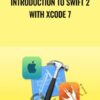$195.00 Original price was: $195.00.$43.00Current price is: $43.00.
Get certified in Linux for LPIC-1 or Comptia Linux+ using this easy to follow course
 Purchase this course you will earn 43 Points worth of $4.30
Purchase this course you will earn 43 Points worth of $4.30Welcome To The Complete Linux LPIC-1 Certification Course Exams 101-102
- Watch the promo video to see How You Can Pass The Linux LPIC-1 Certification Examinations! (101 & 102)
- This Course is MASSIVE! You receive over 18+ hours of video content & 60+ lectures!
- Join Over 275,000+ Students Who Have Enrolled In My Udemy Courses This Year!
- 7,500+ Five Star Reviews on our courses prove Students Who Enrolling Are Getting Real Results!
Then this course is for you! Click "Take This Course Now" For Instant Life-Time Access!
Why should you learn Linux?
Linux is a fast-growing operating system, it is inexpensive and highly flexible. Almost all the key organizations in IT industry including Google use variations of Linux to power their servers. Linux is also a major player in the small and mid-sized server field, and it’s an increasingly viable platform for workstation and desktop use as well. By understanding Linux, you’ll increase your standing in the job market. Even if you already know Windows or Mac OS and your employer uses these systems exclusively, understanding Linux will give you an edge when you’re looking for a new job or you’re looking for a promotion.
The Linux Professional Institute (LPI) has developed its LPI-1 certification as an introductory certification for people who want to enter careers involving Linux. The exam is
meant to certify that an individual has the skills necessary to install, operate, and troubleshoot a Linux system and is familiar with Linux-specific concepts and basic hardware.
The purpose of this course is to help you pass the LPIC-1 exams (101 and 102).
Because these exams cover basic Linux installation, configuration, maintenance,
applications, networking, and security, those are the topics that are emphasized in this
book. You’ll learn enough to get a Linux system up and running and to configure it for
many common tasks.
Why Become Linux Certified through LPIC?
There are four major benefits:
Relevance The LPIC exams were designed with the needs of Linux professionals in mind.
Quality The exams have been extensively tested and validated using psychometric standards.
Neutrality LPI is an organization that doesn’t itself market any Linux distribution.
Support The exams are supported by major players in the Linux world.
Don't miss this opportunity to learn Linux through this easy to follow course and add versatility in your skills, necessary for today's highly competitive market. Click on "Take this Course" now, and I will see you inside.
With the right mindset, understanding, and application of the teachings in this course, you will instantly begin to move towards receiving your Linux LPIC-1 certification.
When we learn something new, I add it to the course – at no additional cost to you! This is a course that will continue to add more and more to every aspect of your life.
In addition to the Udemy 30-day money back guarantee, you have my personal guarantee that you will love what you learn in this course. If you ever have any questions please feel free to message us directly and we will do our best to get back to you as soon as possible!
What I can't do in this Course..
I can't guarantee your success – this course does take work on your part. But You Can Do It!
I am also not responsible for your actions. You are responsible for 100% of the decisions and actions you make while using this course.
This course will not remain this price forever! It's time to take action!
Click the "take this course" button at the top right now!
…every hour you delay is costing you money…
See you in the course!
Sincerely,
Ahmad Nadeem & Joe Parys
Course Curriculum
Section 1: Introduction
- Welcome To Our Course! Learn How To Gain The Most In Our Course! (2:57)
- Introduction (4:45)
Section 2: GNU and UNIX commands
- CLI Introduction and File Management (20:19)
- CLI Introduction And File Management part-2 (8:51)
- Standard Input / Output / Error, Tail and Head (18:32)
- All about vi Editor (28:12)
- Stream Editing Text Files (13:49)
- Setting Environment Variables (19:49)
- Concatenating and Splitting Files (8:38)
- Processing / Filtering text using grep / tee / xargs (15:08)
- Processing / Filtering text using Paste / Join / Expand / Unexpand (14:36)
- Files and Folders Archiving: tar / dd / cpio (21:13)
- Compressing Files using gzip bzip2 and tar (12:55)
- Process Management through Nice and Renice (14:18)
- Putting jobs in Background and Foreground (19:16)
- Terminating Processes (16:21)
Section 3: Shells, Scripting and Data Management
- User Profiles and System Profiles (17:39)
- Scripting Basics (17:15)
- Scripting Basics (Using Loops) part-2 (15:15)
- SQL Data Management (19:05)
- SQL Data Management part-2 (18:30)
Section 4: User Interfaces and Desktops
- X11-Xorg Server And X-11 Forwarding
- X11 Server and X11 Forwarding part-2 (12:41)
- Linux Display Managers (19:31)
- Accessibility Options in Linux (10:41)
Section 5: Devices, Linux Filesystems, Filesystem Hierarchy Standard
- Filesystem Types and Creating Different Filesystems (16:56)
- Filesystem Maintenance (17:14)
- Mounting And Unmounting Of Filesystems
- File System Hierarchy In Linux
- All about Files / Folders Ownership and associated Permissions (23:45)
- Special Permission Bits For Files And Folders (SUID, SGID & Sticky Bit) (15:11)
- SUID, SGID And Sticky Bit Part-2 (12:50)
- What are Soft and Hard Links (16:27)
- Finding Files in Linux (18:51)
- Creating Partitions using MBR and GPT (14:19)
- Creating Partitions using MBR and GPT part-2 (14:31)
- Managing Disk Quotas (12:16)t
Section 6: System Architecture
- Determine Hardware And Manage Kernel Modules (14:17)
- Boot Sequence / Kernel Parameters / Single User Mode / Proper Shutdown (19:25)
- System Initialization through Init, Upstart and Systemd (20:45)
- Run Levels in Linux (20:32)
Section 7: Linux Installation and Package Management
- Describe Common Storage Devices (12:26)
- Logical Volume Manager (15:53)
- Managing Shared Libraries (16:35)
- Managing Bootloaders GRUB GRUB2 (15:09)
- Linux Packages Management through APT (17:21)
- linux Packages Management through YUM (11:53)
- Manage RPM packages (rpm2cpio, cpio commands) (7:53)
Section 8: Administrative Tasks
- Changing Name of your Linux Box
- Managing Users and Groups (19:29)
- Local Passwords Management (16:12)
- Scheduling Tasks In Linux (18:15)
- Scheduling tasks in Linux part-2 (16:57)
- Timezone Settings and Locale (16:42)
- Timezone Settings and Locale (part-2) (7:41)
Section 9: Essential System Services
- Setting Date and Time On Linux (19:32)
- Linux Email Management and Mail Transfer Agents (19:38)
- System Logging in Linux (17:28)
- System Logging in Linux part-2 (19:30)
- System Logging in Linux part-3 (17:15)
Section 10: Networking Fundamentals
- Quick Overview of TCP / UDP and common ports (16:36)
- IPv4 / IPv6 / Netmask / CIDR / Gateways (18:23)
- IPv4 / IPv6 / Netmask / CIDR / Gateways (part-2) (17:20)
- Network Configuration and tips for Debian based distribution (Ubuntu) (25:22)
- Network Configuration and tips for Red Hat based distributiosn (CentOS) (10:11)
- Client Side DNS Settings On Linux (20:45)
Section 11: Security
- Restrictiions through User Limits (ulimit)
- Securing Connection through SSH (17:34)
- Encrypting Data Through GPG (17:24)
- Security Aspects in Linux (18:02)
- Security Aspects in Linux part-2 (18:58)
Get The Complete Linux LPIC-1 Certification Course Exams 101-102 – Joe Parys, Only Price $47
Tag: The Complete Linux LPIC-1 Certification Course Exams 101-102 – Joe Parys Review. The Complete Linux LPIC-1 Certification Course Exams 101-102 – Joe Parys download. The Complete Linux LPIC-1 Certification Course Exams 101-102 – Joe Parys discount.
Only logged in customers who have purchased this product may leave a review.
Related products
Uncategorized
= 85 Points
= 65 Points
= 84 Points
Uncategorized
= 35 Points
Uncategorized
Optimizing Compliance and Maximizing Revenue for Ophthalmology and Optometry – Jeffrey P. Restuccio
= 85 Points
Uncategorized
= 95 Points
= 72 Points
= 94 Points





Reviews
There are no reviews yet.